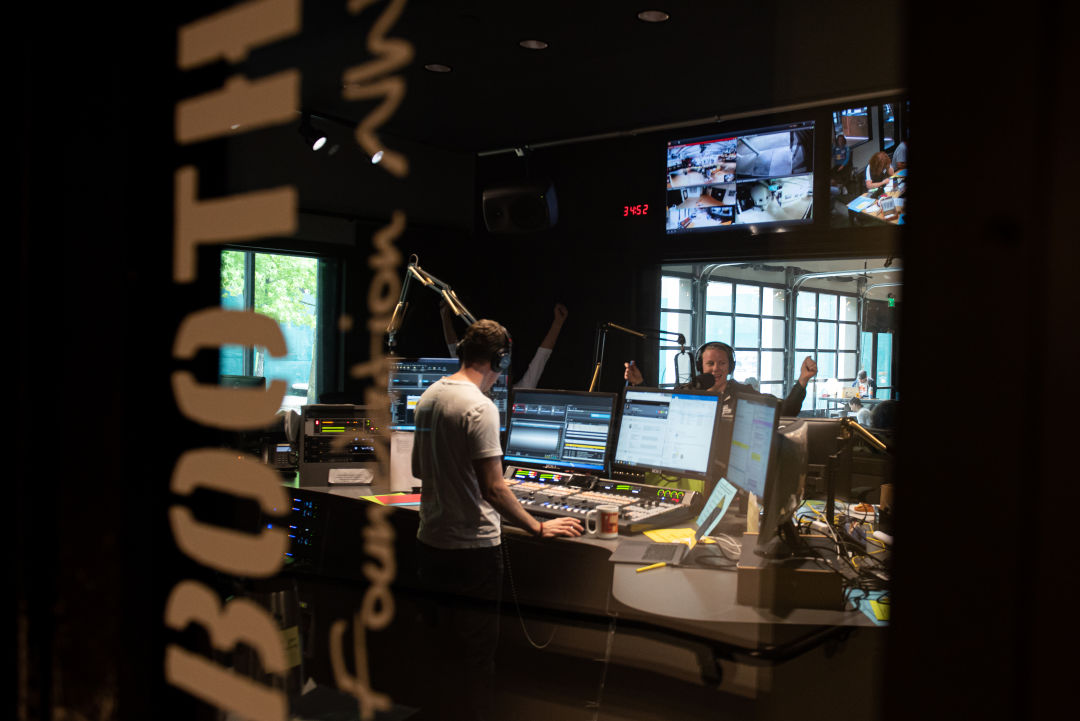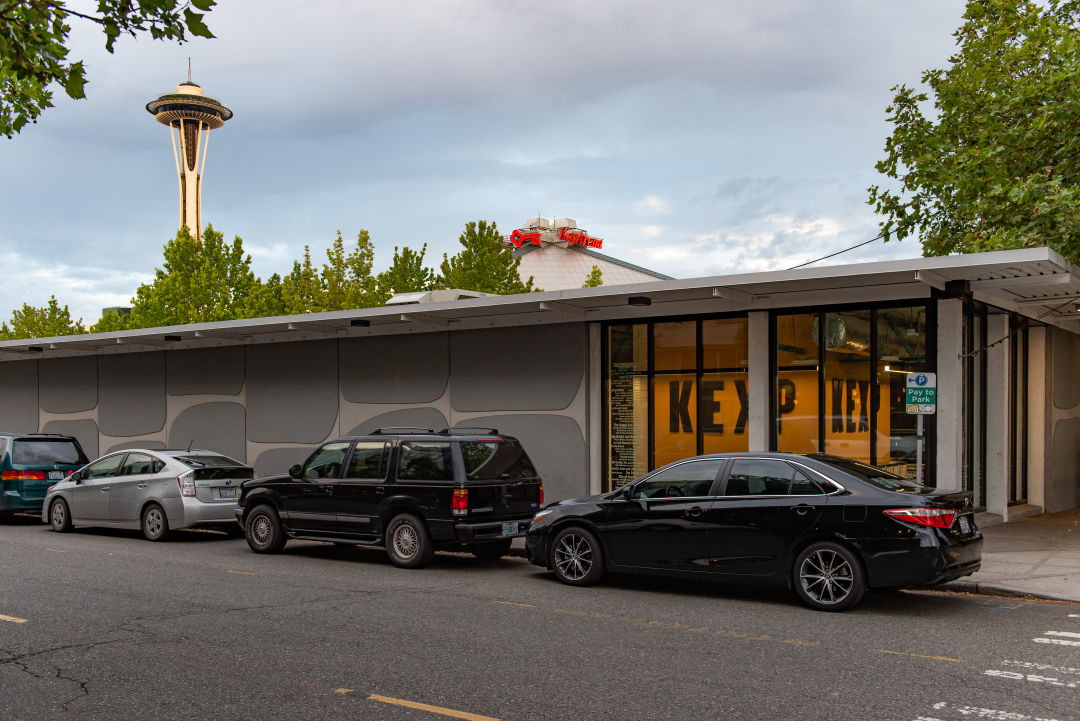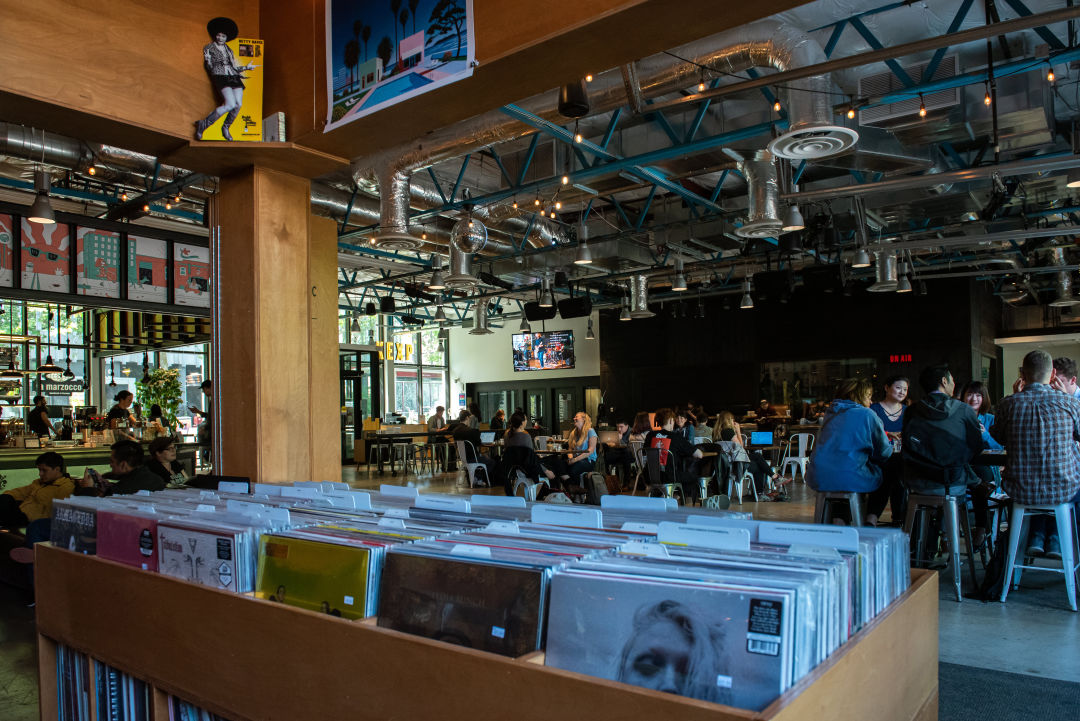
Till now, KEXP’s Bay Space station has merely been a simulcast of the Seattle model. However that is altering.
Brushing up towards the 6 p.m. last name on the Caffe Vita positioned in KEXP’s Gathering Area, half a dozen members of an area e book membership file out into the summer time warmth. On the opposite aspect of the glass, DJ Mike Ramos enters the sales space, setting as much as fill in for the 7pm present.
A lot has modified since Ramos joined Seattle’s iconic unbiased music radio station in 2012. (For example, the Gathering Area itself didn’t open till 2016.) However KEXP’s programming ideas of championing native artists and a number of genres have stayed the identical. Most just lately, KEXP acquired a brand new FM sign within the Bay Space, and as of March 19, has been filling the airways of 92.7 San Francisco/Alameda.
“I’m massively into it,” Ramos, who considers Oakland his second house, says. “The Bay Space has been part of my upbringing … and there’s a lot nice stuff popping out of there.”
However the $3.75 million growth sparked concern in some Seattle listeners. Ramos will get it, likening them to day-one indie band followers who dread change or, on this case, concern seeing their hometown station morph into one thing bigger, much less native, and fewer Seattle. “Individuals try this with bands and radio stations, too, I suppose,” Ramos says with fun.
When CEO Ethan Raup made the announcement in November 2023, he assured listeners that KEXP—“a Seattle-based radio station and humanities group that reaches thousands and thousands of individuals all world wide”—wouldn’t change.
“We have gotten actually snug broadcasting to your complete world from Seattle,” Raup says, “and we’re by no means going to lose our Seattle roots.”
These roots date again to 1972 when KEXP (first known as KCMU) started broadcasting a 10-watt sign on 90.5 FM from the College of Washington’s Communications Constructing. During the last 5 many years, KEXP constructed its success by giving DJs free rein, internet hosting dwell performances, and introducing and celebrating native artists. Alongside the best way, the station has set the gold customary for unbiased radio.
“Staying true to who we’re, that is a bedrock for us,” Raup says. “The opposite is a level of ambition to take what we’re doing and attain extra individuals and interact extra deeply with individuals and make the world a greater place.”

KEXP’s house close to Local weather Pledge Enviornment opened earlier than its neighbor was even known as Local weather Pledge.
Raup sees the brand new enterprise as a part of that second bedrock. He says the Bay Space—which shares parallels with Seattle in its tech economic system and thriving native music scene—supplies a brand new house to check KEXP’s present mannequin.
“That is one other a part of the rationale we had the boldness to attempt it out,” Raup says. “It is one thing we’re very acquainted with based mostly on our expertise in Seattle, the place now we have married what’s a modest broadcast sign with fairly sturdy digital merchandise.”
Considerations about dramatic adjustments at house subsided as 92.7 has to this point functioned as a simulcast of KEXP’s Seattle-based programming. Since March, many Bay Space listeners have warmed to KEXP, very like international listeners tuning into the Seattle-based on-line stream have for years.
Dave Hughes—Bay Space radio present host, music columnist, and longtime KEXP fan—sees no draw back to KEXP’s Bay Space enterprise, “I am at KVHS 90.5 FM out of Harmony within the East Bay, and all of us volunteers over at that neighborhood radio station are thrilled with KEXP coming to the Bay Space,” Hughes says.
Others, like Lisbeth Ortega (often known as DJ Lizzy al Toque), a number at Psyched! Radio in San Francisco, imagine KEXP should up its funding within the Bay Space if it needs to copy the form of supportive, energetic arts neighborhood it has fostered in Seattle.
She feels the thrill that adopted the challenge’s launch in March waned comparatively quick, as did the give attention to native musicians. As she put it, the programming “simply went straight to KEXP stuff.” However KEXP is about to roll out its first weekly 92.7 Bay Space-focused present, Vinelands, August 17.
With the purpose of being “San Francisco’s new station for music discovery,” Chief Programming Officer Chris Kellogg says Vinelands shall be “a broad, cross-genre exploration of music of the Bay Space and Northern California from distinct factors of view.” It’s a mannequin that intently mirrors that of KEXP’s Audioasis (and can run on the similar time for 92.7 listeners, from 6 to 9pm on Saturday nights).

KEXP hopes the mannequin of neighborhood radio it has in-built Seattle will work within the Bay Space.
The present will definitely assist, says Ortega, however not fully. For now, she says, KEXP doesn’t really feel “tangible” within the Bay Space. It’s missing areas like Caffe Vita and occasions like dwell recordings, which had been Ortega’s first introduction to KEXP years in the past.
“I cherished that that they had this neighborhood house,” Ortega says, remembering a visit to Seattle. “I’ve by no means seen that earlier than wherever, not even in a spot like New York or one thing. It felt like they cared about their viewers and wished the viewers to be part of it.”
Followers love KEXP’s old-school, hands-on, and intentionally human nature—a rarity in a digitized and hyper-corporate period the place nationalized playlists and algorithms dominate the music business.
However past the units, a lot of KEXP’s success has to do with the group’s accessibility. Followers name and e mail the DJs, however in addition they brush shoulders with them at occasions and wave to them at work within the studio. And within the case of morning present DJ John Richards, they dine and drink at his bar in Capitol Hill.
Glimpses of an elevated bodily presence within the Bay Space are popping up. Richards just lately spent per week down within the Bay Space and can return in October for a week-long tour of Bay Space data shops alongside KEXP DJs Cheryl Waters and Larry Mizell, Jr. The trio will broadcast from a brand new location every day.
Raup says they’ll proceed to take growth within the Bay gradual—not simply due to monetary constraints, however as a result of they need to do it proper, study the area people, and reply to its requests. How which may affect KEXP extra broadly isn’t totally clear in the intervening time. However Raup says he’s open to something.
“The place it goes over time, I do not know,” he says.

